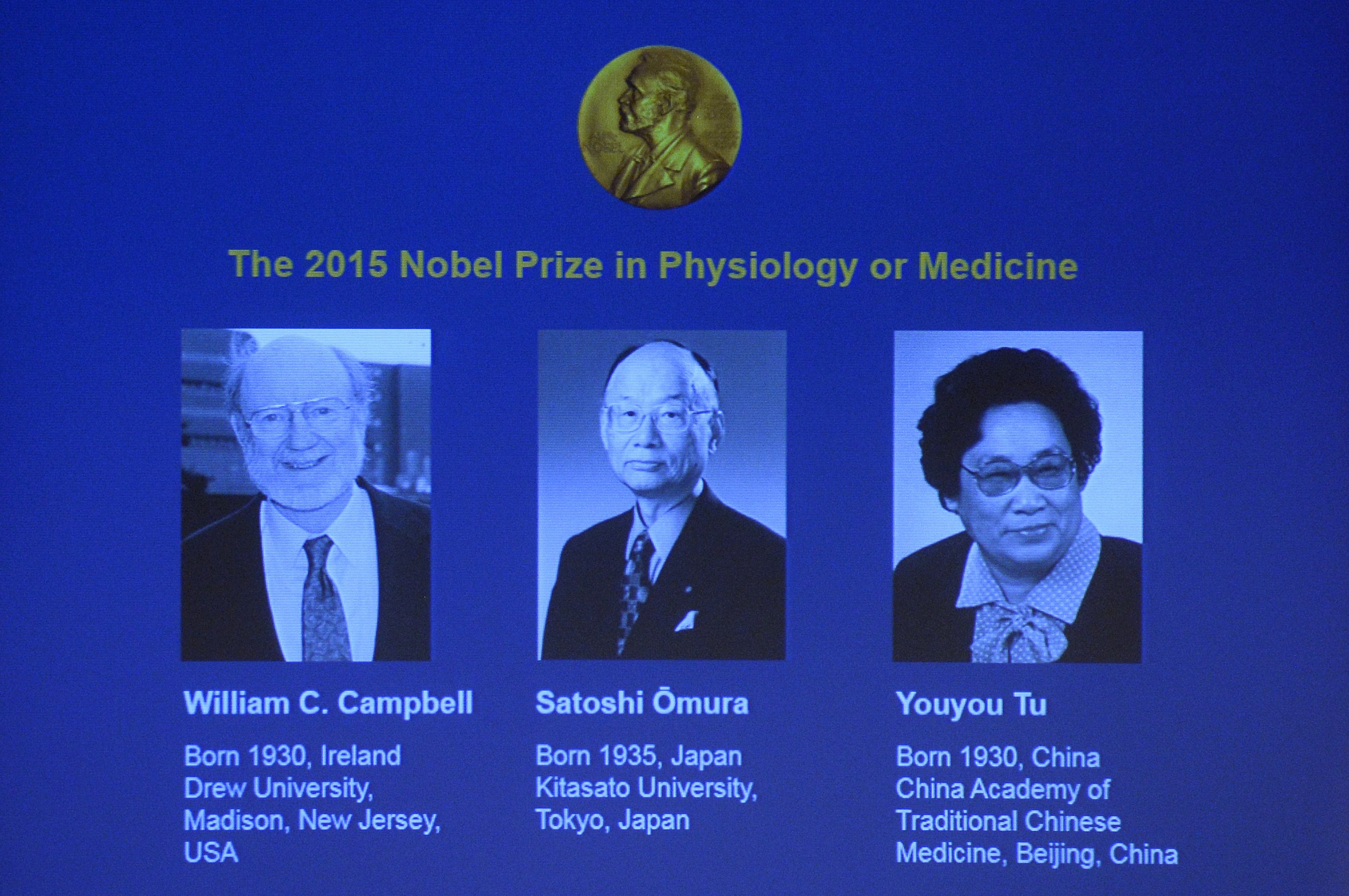Nobel committee awards medicine prize to 3 scientists who tackled parasitic diseases


On Monday, the Nobel committee awarded the annual prize for medicine to three scientists who came up with treatments for parasitic diseases. William C. Campbell and Satoshi Ōmura were jointly awarded the Nobel for their foundational role in developing Avermectin, a drug that has successfully treated river blindness and elephantiasis, two illnesses caused by parasitic roundworms; Youyou Tu was recognized for developing Artemisinin, a drug that has sharply reduced deaths from malaria. "These two discoveries have provided humankind with powerful new means to combat these debilitating diseases that affect hundreds of millions of people annually," the Nobel committee said. "The consequences in terms of improved human health and reduced suffering are immeasurable."
Ōmura, a Japanese microbiologist, isolated about 50 strains of the bacteria group Streptomyces, which Irish-born parasitic biology expert Campbell narrowed down to one strain especially effective at killing parasites in animals. Parasitic worms sicken about a third of the world's population, especially in sub-Sarahan Africa, Latin America, and South Asia. Tu, from China, researched traditional Chinese medicines to come up with a derivative of wormwood that is now used as a primary treament for malaria, a mosquito-borne disease that kills more than 450,00 people a year. For more information, read the Nobel committee's announcement.
A free daily email with the biggest news stories of the day – and the best features from TheWeek.com
The Week
Escape your echo chamber. Get the facts behind the news, plus analysis from multiple perspectives.

Sign up for The Week's Free Newsletters
From our morning news briefing to a weekly Good News Newsletter, get the best of The Week delivered directly to your inbox.
From our morning news briefing to a weekly Good News Newsletter, get the best of The Week delivered directly to your inbox.
Peter has worked as a news and culture writer and editor at The Week since the site's launch in 2008. He covers politics, world affairs, religion and cultural currents. His journalism career began as a copy editor at a financial newswire and has included editorial positions at The New York Times Magazine, Facts on File, and Oregon State University.
-
 Courgette and leek ijeh (Arabic frittata) recipe
Courgette and leek ijeh (Arabic frittata) recipeThe Week Recommends Soft leeks, tender courgette, and fragrant spices make a crisp frittata
-
 Trump’s power grab: the start of a new world order?
Trump’s power grab: the start of a new world order?Talking Point Following the capture of Nicolás Maduro, the US president has shown that arguably power, not ‘international law’, is the ultimate guarantor of security
-
 Unrest in Iran: how the latest protests spread like wildfire
Unrest in Iran: how the latest protests spread like wildfireIn the Spotlight Deep-rooted discontent at the country’s ‘entire regime’ and economic concerns have sparked widespread protest far beyond Tehran
-
 Blue Origin launches Mars probes in NASA debut
Blue Origin launches Mars probes in NASA debutSpeed Read The New Glenn rocket is carrying small twin spacecraft toward Mars as part of NASA’s Escapade mission
-
 Dinosaurs were thriving before asteroid, study finds
Dinosaurs were thriving before asteroid, study findsSpeed Read The dinosaurs would not have gone extinct if not for the asteroid
-
 SpaceX breaks Starship losing streak in 10th test
SpaceX breaks Starship losing streak in 10th testspeed read The Starship rocket's test flight was largely successful, deploying eight dummy satellites during its hour in space
-
 Rabbits with 'horns' sighted across Colorado
Rabbits with 'horns' sighted across Coloradospeed read These creatures are infected with the 'mostly harmless' Shope papilloma virus
-
 Lithium shows promise in Alzheimer's study
Lithium shows promise in Alzheimer's studySpeed Read Potential new treatments could use small amounts of the common metal
-
 Scientists discover cause of massive sea star die-off
Scientists discover cause of massive sea star die-offSpeed Read A bacteria related to cholera has been found responsible for the deaths of more than 5 billion sea stars
-
 'Thriving' ecosystem found 30,000 feet undersea
'Thriving' ecosystem found 30,000 feet underseaSpeed Read Researchers discovered communities of creatures living in frigid, pitch-black waters under high pressure
-
 New York plans first nuclear plant in 36 years
New York plans first nuclear plant in 36 yearsSpeed Read The plant, to be constructed somewhere in upstate New York, will produce enough energy to power a million homes
